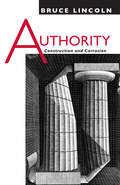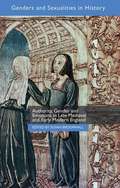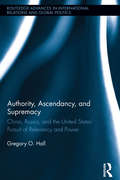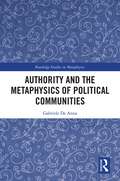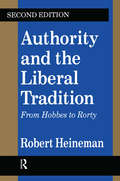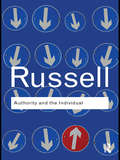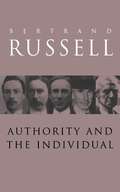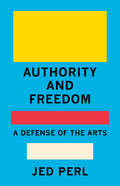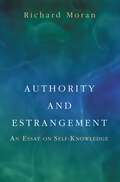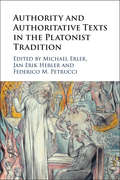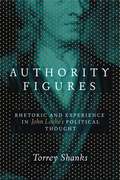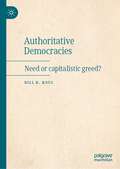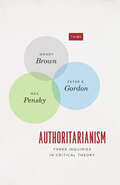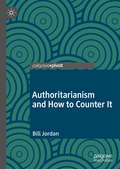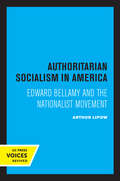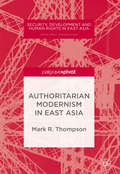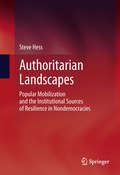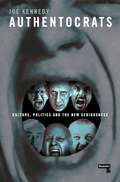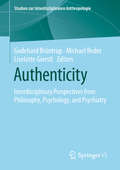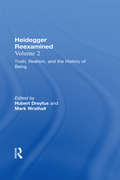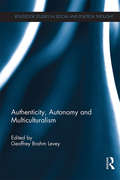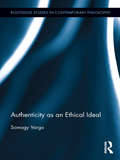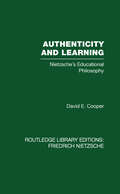- Table View
- List View
Authority: Construction and Corrosion
by Bruce LincolnWhat is authority? How is it constituted? How ought one understand the subtle (and sometimes not-so-subtle) relations between authority and coercion? Between authorized and subversive speech? In this fascinating and intricate analysis, Bruce Lincoln argues that authority is not an entity but an effect. More precisely, it is an effect that depends for its power on the combination of the right speaker, the right speech, the right staging and props, the right time and place, and an audience historically and culturally conditioned to judge what is right in all these instances and to respond with trust, respect, and even reverence. Employing a vast array of examples drawn from classical antiquity, Scandinavian law, Cold War scholarship, and American presidential politics, Lincoln offers a telling analysis of the performance of authority, and subversions of it, from ancient times to the present. Using a small set of case studies that highlight critical moments in the construction of authority, he goes on to offer a general examination of "corrosive" discourses such as gossip, rumor, and curses; the problematic situation of women, who often are barred from the authorizing sphere; the role of religion in the construction of authority; the question of whether authority in the modern and postmodern world differs from its premodern counterpart; and a critique of Hannah Arendt's claims that authority has disappeared from political life in the modern world. He does not find a diminution of authority or a fundamental change in the conditions that produce it. Rather, Lincoln finds modern authority splintered, expanded, and, in fact, multiplied as the mechanisms for its construction become more complex—and more expensive.
Authority, Gender and Emotions in Late Medieval and Early Modern England
by Susan BroomhallThis collection explores how situations of authority, governance, and influence were practised through both gender ideologies and affective performances in medieval and early modern England. Authority is inherently relational it must be asserted over someone who allows or is forced to accept this dominance. The capacity to exercise authority is therefore a social and cultural act, one that is shaped by social identities such as gender and by social practices that include emotions. The contributions in this volume, exploring case studies of women and men's letter-writing, political and ecclesiastical governance, household rule, exercise of law and order, and creative agency, investigate how gender and emotions shaped the ways different individuals could assert or maintain authority, or indeed disrupt or provide alternatives to conventional practices of authority.
Authority, Ascendancy, and Supremacy: China, Russia, and the United States' Pursuit of Relevancy and Power (Routledge Advances in International Relations and Global Politics)
by Gregory O. HallAuthority, Ascendancy, and Supremacy examines the American, Chinese, and Russian (Big 3) competition for power and influence in the Post-Cold War Era. With the ascension of regional powers such as India, Iran, Brazil, and Turkey, the Big 3 dynamic is an evolving one, which cannot be ignored because of its effect to not only reshape regional security, but also control influence and power in world affairs. How does one define a "global" or "regional" power in the Post-Cold War Era? How does the relationships among the Big 3 influence regional actors? Gregory O. Hall utilizes country data from primary and secondary sources to reveal that since the early 1990s, competition for influence and power among the Big 3 has intensified and could result in armed confrontation among the major powers. He assesses the state of affairs in each country’s economic, resource, military, social/demographic, and political spheres. In addition, events data, which focuses on international interactions, facilitates identifying trends in Big 3 interactions as well as their concerns and affairs with regional players. Opinion data, drawn from policy makers, scholarly interviews, and survey research data, identifies foreign policy interests among the Big 3, as well non-Big 3 foreign policy behaviors. With its singular focus on American, Chinese, and Russian interactions, policy interests, and behaviors, Authority, Ascendancy, and Supremacy represents a significant contribution for understanding and managing Post-Cold War conflicts and promises to be an important book.
Authority and the Metaphysics of Political Communities (Routledge Studies in Metaphysics)
by Gabriele De AnnaThis book explores the metaphysics of political communities. It discusses how and why a plurality of individuals becomes a political unity, what principles or forces keep that unity together, and what threats that unity can be faced with. In Part I, the author justifies the need for the notion of substance in metaphysics in general and in the metaphysics of politics in particular. He spells out a moderately realist theory of substances and of their principles of unity, which supports substantial gradualism. Part II concerns action theory and the nature of practical reason. The author claims that the acknowledgement of reasons by agents is constitutive of action and that normativity depends on the role of the good in the formation of reasons. Finally, in Part III the author addresses the notion of political community. He claims that the principle of unity of a political community is its authority to give members of the community moral reasons for action. This suggests a middle way between liberal individualism and organicism, and the author demonstrates the significance of this view by discussing current political issues such as the role of religion in the public sphere and the political significance of cultural identity. Authority and the Metaphysics of Political Communities will be of interest to researchers and advanced students working in social metaphysics, political philosophy, philosophy of action, and philosophy of the social sciences.
Authority and the Liberal Tradition: From Hobbes to Rorty
by Robert HeinemanAuthority and the Liberal Tradition critically describes the historical foundations of modem liberalism, implicitly analyzing the status and effectiveness of American democracy. Heineman examines contemporary liberal ideology, which he argues undermines the normative basis of social stability that was an Important element in the classical liberal tradition. Heineman shows how American government has become hostage to ideology, to the advocacy of interest-group politics. Placing major Anglo-American thinkers from Hobbes to Rorty in their social contexts, Heineman traces the liberal intellectual perspective as it has evolved from the integration of culture and philosophy. He illustrates how the disjunction of theory and culture now weakens liberal thought as a foundation for effective government. Instead, he proposes returning to a philosophical position that consciously relies on community traditions and values, which can support democratic ideology. Authority and the Liberal Tradition is especially timely at this juncture In American history, as fragmentation of the national policy process threatens government's ability to cope with major problems. This second edition includes two chapters of entirely new material: “Liberal Ideology in a Conservative Nation” and "The Dialogue of Modem Liberalism.” It will be of interest to political scientists, social theorists, and philosophers.
Authority and the Individual (Routledge Classics)
by Bertrand RussellFrom Ancient Greek philosophy to the French Revolution to the modern welfare state, in Authority and the Individual Bertrand Russell tackles the perennial questions about the balance between authority and human freedom. With characteristic clarity and deep understanding, he explores the formation and purpose of society, education, moral evolution and social, economical and intellectual progress. First of the famous BBC Reith lectures, this wonderful collection delivers Russell at his intellectual best.
Authority and the Individual
by Bertrand RussellFrom Ancient Greek philosophy to the French Revolution to the modern welfare state, in Authority and the Individual Bertrand Russell tackles the perennial questions about the balance between authority and human freedom. With characteristic clarity and deep understanding, he explores the formation and purpose of society, education, moral evolution and social, economical and intellectual progress. First of the famous BBC Reith lectures, this wonderful collection delivers Russell at his intellectual best.First published in 1985. Routledge is an imprint of Taylor & Francis, an informa company.
Authority and Freedom: A Defense of the Arts
by Jed PerlFrom one of our most widely admired art critics comes a bold and timely manifesto reaffirming the independence of all the arts—musical, literary, and visual—and their unique and unparalleled power to excite, disturb, and inspire us.As people look to the arts to promote a particular ideology, whether radical, liberal, or conservative, Jed Perl argues that the arts have their own laws and logic, which transcend the controversies of any one moment. &“Art&’s relevance,&” he writes, &“has everything to do with what many regard as its irrelevance.&” Authority and Freedom will find readers from college classrooms to foundation board meetings—wherever the arts are confronting social, political, and economic ferment and heated debates about political correctness and cancel culture. Perl embraces the work of creative spirits as varied as Mozart, Michelangelo, Jane Austen, Henry James, Picasso, and Aretha Franklin. He contends that the essence of the arts is their ability to free us from fixed definitions and categories. Art is inherently uncategorizable—that&’s the key to its importance. Taking his stand with artists and thinkers ranging from W. H. Auden to Hannah Arendt, Perl defends works of art as adventuresome dialogues, simultaneously dispassionate and impassioned. He describes the fundamental sense of vocation—the engagement with the tools and traditions of a medium—that gives artists their purpose and focus. Whether we&’re experiencing a poem, a painting, or an opera, it&’s the interplay between authority and freedom—what Perl calls &“the lifeblood of the arts&”—that fuels the imaginative experience. This book will be essential reading for everybody who cares about the future of the arts in a democratic society.
Authority and Estrangement: An Essay on Self-Knowledge
by Richard MoranSince Socrates, and through Descartes to the present day, the problems of self-knowledge have been central to philosophy's understanding of itself. Today the idea of ''first-person authority''--the claim of a distinctive relation each person has toward his or her own mental life--has been challenged from a number of directions, to the point where many doubt the person bears any distinctive relation to his or her own mental life, let alone a privileged one. In Authority and Estrangement, Richard Moran argues for a reconception of the first-person and its claims. Indeed, he writes, a more thorough repudiation of the idea of privileged inner observation leads to a deeper appreciation of the systematic differences between self-knowledge and the knowledge of others, differences that are both irreducible and constitutive of the very concept and life of the person. Masterfully blending philosophy of mind and moral psychology, Moran develops a view of self-knowledge that concentrates on the self as agent rather than spectator. He argues that while each person does speak for his own thought and feeling with a distinctive authority, that very authority is tied just as much to the disprivileging of the first-person, to its specific possibilities of alienation. Drawing on certain themes from Wittgenstein, Sartre, and others, the book explores the extent to which what we say about ourselves is a matter of discovery or of creation, the difficulties and limitations in being ''objective'' toward ourselves, and the conflicting demands of realism about oneself and responsibility for oneself. What emerges is a strikingly original and psychologically nuanced exploration of the contrasting ideals of relations to oneself and relations to others.
Authority and Authoritative Texts in the Platonist Tradition
by Federico M. Petrucci Michael Erler Jan Erik Heßler Michael McoskerAll disciplines can count on a noble founder, and the representation of this founder as an authority is key in order to construe a discipline's identity. This book sheds light on how Plato and other authorities were represented in one of the most long-lasting traditions of all time. It leads the reader through exegesis and polemics, recovery of the past and construction of a philosophical identity. From Xenocrates to Proclus, from the sceptical shift to the re-establishment of dogmatism, from the Mosaic of the Philosophers to the Neoplatonist Commentaries, the construction of authority emerges as a way of access to the core of the Platonist tradition.
Authority Figures: Rhetoric and Experience in John Locke's Political Thought
by Torrey ShanksIn Authority Figures, Torrey Shanks uncovers the essential but largely unappreciated place of rhetoric in John Locke’s political and philosophical thought. Locke’s well-known hostility to rhetoric has obscured an important debt to figural and inventive language. Here, Shanks traces the close ties between rhetoric and experience as they form the basis for a theory and practice of judgment at the center of Locke’s work. Rhetoric and experience come together, for Locke, to reorient readers’ relation to the past in order to open up alternative political futures. Recognizing this debt sets the stage for a new understanding of the Two Treatises of Government, in which the material and creative force of language is necessary for political critique.Authority Figures draws together political theory and philosophy, the history of science and of rhetoric, and philosophy of language and literary theory to offer an interpretation of Locke’s political thought that shows the ongoing importance of rhetoric for new modes of critique in the seventeenth century. Locke’s thought offers up insights for rethinking the relationship of rhetoric and experience to political critique, as well as the intersections of language and materialism.
Authority Figures: Rhetoric and Experience in John Locke's Political Thought
by Torrey ShanksIn Authority Figures, Torrey Shanks uncovers the essential but largely unappreciated place of rhetoric in John Locke’s political and philosophical thought. Locke’s well-known hostility to rhetoric has obscured an important debt to figural and inventive language. Here, Shanks traces the close ties between rhetoric and experience as they form the basis for a theory and practice of judgment at the center of Locke’s work. Rhetoric and experience come together, for Locke, to reorient readers’ relation to the past in order to open up alternative political futures. Recognizing this debt sets the stage for a new understanding of the Two Treatises of Government, in which the material and creative force of language is necessary for political critique.Authority Figures draws together political theory and philosophy, the history of science and of rhetoric, and philosophy of language and literary theory to offer an interpretation of Locke’s political thought that shows the ongoing importance of rhetoric for new modes of critique in the seventeenth century. Locke’s thought offers up insights for rethinking the relationship of rhetoric and experience to political critique, as well as the intersections of language and materialism.
Authority
by Frank FurediWhere schools in the past used to introduce young people to the norms and values of society, today it seems that schools are there primarily to deal with students' difficult behavior. The school has become a course in Life Skills. Students have to be taught to control their behavior. This shift in priorities has been fed largely by experts in education and other fields, and in so doing they have often pitted schools against parents. This is one of the dangers of the trend, but this kind of therapeutic education also leaves insufficient time and resources for teachers to intellectually stimulate their students.
Authoritative Democracies: Need or capitalistic greed?
by Bill K. KoulThis book comments on growing authoritarianism in democracy and suggests how it ought to be instead. It asks if some degree of authoritarianism is the need of the hour to address potentially existential issues facing the human race. Readers are encouraged to analyse the state of democracy in their own countries and verify if it meets their expectations, or if it is just a myth or an imposter, or a necessary but imperfect compulsion in the absence of a perfect alternative. The book presents a commentary on the state of democracy in some of the world’s leading democracies. It aims to challenge the human mind, which seems to be getting accustomed to not having to think, thanks to a constant bombardment of information—real and fake and in-between—that it receives through social and print media, which is freely accessible through smartphone to which it has become addicted. It discusses how the drivers of capitalism – through their business-like connections with powerful and influential politicians and celebrities—could be cleverly manipulating the gullible human mind and exploiting the system to their own material benefit.
Authoritarianism: Three Inquiries in Critical Theory (TRIOS)
by Wendy Brown Peter E. Gordon Max PenskyThree distinguished scholars draw on critical theory to address the causes and circumstances behind the rise of autocracies and oligarchies.Across the Euro-Atlantic world, political leaders have been mobilizing their bases with nativism, racism, xenophobia, and paeans to “traditional values,” in brazen bids for electoral support. How are we to understand this move to the mainstream of political policies and platforms that lurked only on the far fringes through most of the postwar era? Does it herald a new wave of authoritarianism? Is liberal democracy itself in crisis?In this volume, three distinguished scholars draw on critical theory to address our current predicament. Wendy Brown, Peter E. Gordon, and Max Pensky share a conviction that critical theory retains the power to illuminate the forces producing the current political constellation as well as possible paths away from it. Brown explains how “freedom” has become a rallying cry for manifestly un-emancipatory movements; Gordon dismantles the idea that fascism is rooted in the susceptible psychology of individual citizens and reflects instead on the broader cultural and historical circumstances that lend it force; and Pensky brings together the unlikely pair of Tocqueville and Adorno to explore how democracies can buckle under internal pressure.These incisive essays do not seek to smooth over the irrationality of the contemporary world, and they do not offer the false comforts of an easy return to liberal democratic values. Rather, the three authors draw on their deep engagements with nineteenth—and twentieth—century thought to investigate the historical and political contradictions that have brought about this moment, offering fiery and urgent responses to the demands of the day.“A brilliant and urgent assessment of democracy’s current crisis and capitalism’s increasing authoritarianism. . . . a profound diagnosis of this moment’s political ills.” —Astra Taylor, author of Democracy May Not Exist, but We’ll Miss It When It's Gone
Authoritarianism and How to Counter It
by Bill JordanAfter the collapse of the Soviet Union, it was assumed that liberal democracies would flourish worldwide. Instead, today authoritarian leaders are gaining power – from Trump’s US and Bolsonaro's Brazil to Orban's Hungary – while Russia and China have turned back towards their old, autocratic traditions. This book examines the origins and implications of this shift, and focusses especially on the longstanding coercion of poor people. As industrial employment, and now also many service jobs, are being replaced through technological innovations, state-subsidised, low-paid, insecure work is being enforced through regimes of benefits cuts and sanctions. Authoritarians are exploiting the divisions in the working class that this creates to stoke resentment against immigrants and poor people. The author identifies new social movements and policies (notably the Universal Basic Income) which could counter these dangers.
Authoritarian Socialism in America: Edward Bellamy and the Nationalist Movement
by Arthur LipowIn Authoritarian Socialism Arthur Lipow raises important issues about the nature of democracy and defines the intellectual roots of the authoritarian side of the socialist tradition in America and distinguishes it from democratic socialism. This title is part of UC Press's Voices Revived program, which commemorates University of California Press’s mission to seek out and cultivate the brightest minds and give them voice, reach, and impact. Drawing on a backlist dating to 1893, Voices Revived makes high-quality, peer-reviewed scholarship accessible once again using print-on-demand technology. This title was originally published in 1982.
Authoritarian Modernism in East Asia (Security, Development and Human Rights in East Asia)
by Mark R. ThompsonFollowing Barrington Moore Jr., this book raises doubts about modernization theory’s claim that an advanced economy with extensive social differentiation is incompatible with authoritarian rule. Authoritarian modernism in East Asia (Northeast and Southeast Asia) has been characterized by economically reformist but politically conservative leaders who have attempted to learn the “secrets” of authoritarian rule in modern society. They demobilize civil society while endeavoring to establish an “ethical” form of rule and claim reactionary culturalist legitimation. With China, East Asia is home to the most important country in the world today that is rapidly modernizing while attempting to remain authoritarian.
Authoritarian Landscapes: Popular Mobilization and the Institutional Sources of Resilience in Nondemocracies
by Steve HessThe turbulent year of 2011 has brought the appearance of mass popular unrest and the collapse of long lived autocratic regimes in Egypt, Tunisia, Libya and possibly Syria. The sudden and unanticipated fall of these regimes - often thought of as exemplars of authoritarian resilience - has brought much of the conventional wisdom on the durability and vulnerability of nondemocratic regimes into question. This book seeks to advance the existing literature by treating the autocratic state not as a unitary actor characterized by strength or weakness but rather as a structure or terrain that can alternatively inhibit or facilitate the appearance of national level forms of protests. In the mode of the Arab Spring, the color revolutions of the former Soviet Union, and the people power movement of the Philippines, such movements overcome the daunting impediments presented by autocrats, appeal to likeminded counterparts across society, and overwhelm the ability of regimes to maintain order. Conversely, in other settings, such as contemporary China, decentralized state structures provide an inhospitable environment for national-level protest, leading collective actors to opt for more local and parochial forms of contention. This outcome produces paradoxical situations, such as in the PRC, where protests are frequent but national-level mobilization and coordination is absent.
Authentocrats: Culture, Politics and the New Seriousness
by Joe Kennedy"The Authentocrats" claim to the be the new voice of common sense that speak for the common man and woman; right-wing, traditional and dangerous, Joe Kennedy argues that they are everything but what they purport to be.In contemporary Britain, a lot has been said about what it is that “real people” want politically. Forgotten by elites and sick of globalisation, so the story goes, they demand patriotism, respect for the military, assurances on defence, and controls on immigration. In trying to meet these supposed wishes, politicians attempt to appear normal, salt-of-the-earth, authentic. Authentocrats examines the function of this “authenticity” in a centrist politics which, paradoxically, often defines itself as cosmopolitan, technocratic and opposed to populism. Casting a doubtful eye over – amongst other things – latter-day James Bond films, contemporary nature writing and stand-up comedy, Authentocrats suggests that the sooner we can break with the sententiousness of a skewed conception of authenticity in aesthetics and politics the better.
Authenticity: Interdisciplinary Perspectives from Philosophy, Psychology, and Psychiatry (Studien zur Interdisziplinären Anthropologie)
by Michael Reder Godehard Brüntrup Liselotte GierstlToday, authenticity is considered an essential part of manifold interpersonal relationships, actions, and agreements. Authenticity’s association with sincerity, honesty, and reliability not only normatively charges the term in the context of social coexistence, but also makes it a demand which we impose on ourselves: The success of our lives is measured decisively by whether we live in harmony with our own convictions, wishes and needs. In philosophy, authenticity has also become the focus of interest, both in the context of the mechanisms of self-knowledge, as well as of personal development.The anthology aims to expand the cooperation across disciplines, in order to develop a comprehensive and profound understanding of authenticity, not by over-simplifying the highly complex subject, but by approaching the underlying concept from different scientific perspectives.
Authenticity, Death, and the History of Being: Heidegger Reexamined
by Hubert Dreyfus Mark WrathallFirst Published in 2003. Heidegger and the study of his thought have earned wide acceptance, extending beyond philosophy to influence an array of other disciplines. Critically selected by leading scholars in the field, the articles in this new collection bring together the most essential and representative scholarship on Heidegger. Focusing on the major phases of his work which attracted most attention from contemporary thinkers, as well as exploring new and important areas of Heidegger scholarship, this four-volume set is an invaluable resource for any curriculum supporting philosophy, as well as political theory, literature, classics, anthropology, and cultural studies.
Authenticity, Autonomy and Multiculturalism (Routledge Studies in Social and Political Thought)
by Geoffrey Brahm LeveyThe concept of "authenticity" enters multicultural politics in three distinct but interrelated senses: as an ideal of individual and group identity that commands recognition by others; as a condition of individuals’ autonomy that bestows legitimacy on their values, beliefs and preferences as being their own; and as a form of cultural pedigree that bestows legitimacy on particular beliefs and practices (commonly called "cultural authenticity"). In each case, the authenticity idea is called on to anchor or legitimate claims to some kind of public recognition. The considerable work asked of this concept raises a number of vital questions: Should "authenticity" be accorded the importance it holds in multicultural politics? Do its pitfalls outweigh its utility? Is the notion of "authenticity" avoidable in making sense of and evaluating cultural claims? Or does it, perhaps, need to be rethought or recalibrated? Geoffrey Brahm Levey and his distinguished group of philosophers, political theorists, and anthropologists challenge conventional assumptions about "authenticity" that inform liberal responses to minority cultural claims in Western democracies today. Discussing a wide range of cases drawn from Britain and continental Europe, North America, Australia and the Middle East, they press beyond theories to consider also the practical and policy implications at stake. A helpful resource to scholars worldwide in Political and Social Theory, Political Philosophy, Legal Anthropology, Multiculturalism, and, more generally, of cultural identity and diversity in liberal democracies today.
Authenticity as an Ethical Ideal (Routledge Studies in Contemporary Philosophy)
by Somogy VargaAuthenticity has become a widespread ethical ideal that represents a way of dealing with normative gaps in contemporary life. This ideal suggests that one should be true to oneself and lead a life expressive of what one takes oneself to be. However, many contemporary thinkers have pointed out that the ideal of authenticity has increasingly turned into a kind of aestheticism and egoistic self-indulgence. In his book, Varga systematically constructs a critical concept of authenticity that takes into account the reciprocal shaping of capitalism and the ideal of authenticity. Drawing on different traditions in critical social theory, moral philosophy and phenomenology, Varga builds a concept of authenticity that can make intelligible various problematic and potentially exhausting practices of the self.
Authenticity and Learning: Nietzsche's Educational Philosophy (Rouledge Library Editions: Friedrich Nietzsche)
by David CooperDavid E. Cooper elucidates Nietzsche's educational views in detail, in a form that will be of value to educationalists as well as philosophers. In this title, first published in 1983, he shows how these views relate to the rest of Nietzsche's work, and to modern European and Anglo-Saxon philosophical concerns. For Nietzsche, the purpose of true education was to produce creative individuals who take responsibility for their lives, beliefs and values. His ideal was human authenticity. David E. Cooper sets Nietzsche's critique against the background of nineteenth-century German culture, yet is concerned at the same time to emphasize its bearing upon recent educational thought and policy.
